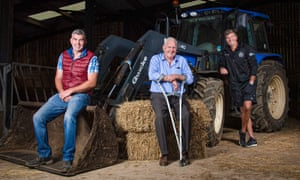Most of the best upwardly mobile stories in British professional team sport have been football yarns. Wimbledon’s Crazy Gang, Brian Clough’s Nottingham Forest, Sir Alex Ferguson’s Aberdeen: all were character-heavy outsiders who confounded their more fancied rivals. More recently there has been Leicester City, winners of the 2015-16 Premier League having played in the third tier only seven years earlier.
None of the above, though, can outdo the improbable journey of Exeter RFC from the edge of nowhere to the European Champions Cup final. If that sounds a bold claim, consider the evidence. Just over 10 years ago the fun-loving Chiefs were still a Championship team and had never featured in the country’s top division. They are not bankrolled by billionaire overseas owners, still rely on homegrown West Country talent and sundry cast-offs and even have a director of rugby, Rob Baxter, who could, if asked, shear a sheep on the Ashton Gate pitch before kick-off.
As they head back to the same city where they earned promotion in 2010, even Baxter is pinching himself. “Maybe it’s not irony, maybe it’s just fate,” he murmured this week. “That’s the circle of life sometimes.” Win or lose to Racing 92 in Bristol, Exeter have already given joyous hope to every rural kid sick of watching teams from the big smoke win everything. With two major finals in the next nine days, just one unanswered question still floats in the autumnal Devon air: how, exactly, have they prospered while so many others have not?
After two years spent compiling a book about the club’s rise with the invaluable help of dozens of players, coaches and club stalwarts, here are a few personal observations. Vinnie Jones, Cloughie and Sir Alex would all, for a start, have enjoyed the refreshingly down-to-earth Chiefs environment. As Baxter often says: “We don’t mind you being as odd as you like or what you do away from here. You can drive whatever car you like, you can dress how you like. But when you come in here what makes us strong is that we all go in the same direction.”
It was a Maori prop named Hoani Tui who first alerted Baxter to another crucial element. Back when Exeter were awaiting their debut Premiership season, Baxter canvassed his players on the qualities required to stay up. “The things that cropped up the most were attitude, commitment and enjoyment. We had ‘ACE’ written up everywhere. But the interesting one for me was ‘enjoyment’. Hoani was the guy who brought it up. He said it was really important to him to enjoy training and playing. He felt it brought the best out of him. Ten years ago nobody really talked about fun in professional sport.”
A decade on and the results are there for all to see. The bus trips are less wild west but Exeter remain committed to playing with a smile on their faces. Sophisticated European thoroughbreds? Even now they reminisce fondly about the time Ben White, the club’s Australian back-rower, shouted: “Take that, you French bastards!” during a Challenge Cup game against Cavalieri Prato. Only when he turned around did he notice his teammates doubled up with laughter. “Mate, they’re from Italy!”
Do not, though, be fooled. Exeter are infinitely smarter than many appreciate. Their shrewd chief executive, Tony Rowe, has developed – pre-Covid at least – a thriving conference business at Sandy Park and his coaching staff also work insane hours. The Baxter family – Rob, his brother, Richie, and their father, John, played over 1,000 first-team games for Exeter between them – still live in neighbouring homes on the 300-acre family farm but Baxter Sr can go days in mid-winter without glimpsing his workaholic son: “Rob lives next door but sometimes the only time I see him is on TV.”

The Chiefs have also always prided themselves on being unusually fit, inspired by the Royal Marines based just down the road at Lympstone, The loyal former wing Matt Jess remembers the club’s Welsh full-back Phil Dollman collapsing after one particularly brutal Friday session on Exmouth beach. “It was all about the Marine mentality: resilience, teamwork, testing the boundaries. Can you stick at it? You’d take yourself to your absolute limit – and then you’d go beyond it. That would transfer to the pitch.”
Did you know, furthermore, that Exeter have spent years calling set moves named after different curry dishes? Or that their trademark style of play is based on the San Francisco 49ers NFL side of the 1980s, specifically the “West Coast Offense” designed by the legendary Bill Walsh? The Chiefs have dubbed their version the “South Coast Offense” but it employs the same principles: stretching defences and creating space through passing and angled running, rather than simply smashing into people.
Ali Hepher, Baxter’s right-hand man and creative muse, is by far the most underrated head coach in Europe. Problem-solving runs in his family; his father was a project engineer for the company that designed warning systems for the Eurofighter Typhoon. Hunter, too, has an equally sharp, enquiring mind. “In English rugby there’s a lot of ‘silo coaching’,” says the latter. “People think: ‘That guy’s a forwards coach, that guy’s a defence coach.’ Here we have a vision for the game and everything serves that. The set piece doesn’t sit in isolation: it serves the attack. Being dominant up front is not an end in itself, it’s to create space.”

But hang on? What about the perception of Exeter as one-dimensional bores? Hunter feels it is laughable. “My biggest pet hate in punditry is when people say: ‘They’ve got no Plan B.’ We’ve got thousands of plans. We’ve got a whole menu. It depends on the opposition, what they’re doing and where we can expose them.” And if Exeter’s formidable driven maul is successful, why abandon it? “For three or four years I sat in the stand thinking: ‘I can’t believe this,’” continues Hunter. “No one was putting any numbers in against us. If they’d put eight guys in, we’d have moved the ball.”
Ask Baxter to identify his team’s magic ingredient, though, and he highlights something completely different. “If someone said to me: ‘What’s been the key to it all?’ I’d say it’s because I’ve also been the analyst. To this day I’ve coded all our senior games. It takes at least five hours but it doesn’t half make sure you stay on top of things. I feel I know exactly where the team is at. It also gives you so much more insight into the type of player you want to recruit.”
It explains why so many supposed “misfits” settle seamlessly into Exeter’s system. “We don’t go looking for the family guy but we are looking for the qualities that radiate from that sort of person,” continues Baxter. “We probably pick that up from their rugby before we’ve even met them. You’ll see if someone has a hissy fit every time something goes against him. You’ll see from his body language whether he’s a guy who wants to stand and fight.” Hunter argues it boils down to clear-eyed logic. “I can remember talking about a non-international player at another club. Rob said to me: ‘If it looks like a pig, smells like a pig and oinks like a pig, it’s probably a pig.’ I quickly learned from him to trust your own instincts.”
Like Clough before him, Baxter also has a sixth sense about players rejected by others. When he went to sign the Leicester and England forward Thomas Waldrom at a motorway service station, for example, he could see the player eyeing a chocolate muffin on display by the counter. Not only did he encourage Waldrom to order it, he would turn a blind eye whenever the No 8 slipped away with Tomas Francis for a cream tea in Topsham the afternoon before a game. Thomas the Tank more than repaid him via sheer weight of tries, as contented players often do.
Long-time Exeter servants also highlight a 35-8 thrashing by Clermont Auvergne in October 2016 as a pivotal moment. It proved the catalyst for the club becoming properly serious about winning major trophies. “A line was drawn in the sand,” recalls their former prop Carl Rimmer. “Looking back, that was the moment when it became rugby first, fun second. Then we discovered something else. As the rugby got better so did the fun.”

Which is where Exeter are now: on the cusp of something truly special but still relishing every second, a proper rugby club in a po-faced professional world. Founded in 1871, the same year as the Rugby Football Union, and about to celebrate their 150th anniversary, the supposed arrivistes have been around longer than Gloucester, Bristol, Leicester or Northampton. John Baxter reckons it was simple geography that previously held them back. Before the M5 was built the journey to Devon took so long many leading clubs would travel down only for Easter tours.
Now, finally, there is a proper heavyweight team south and west of Bristol. It remains desperately sad that Ashton Gate will be deserted for the final but thousands of hearts are already pounding across the West Country. Can they do it? Listening to Rob Baxter, it is hard to imagine Racing will have it easy. “The most important thing is that we do ourselves justice. I’m not a big believer that we should be pleased just to be there. We’re way beyond that now. It’s not a dream, it’s a reality. We’re there and now we’ve got to go and take it with both hands.”
Exe Men: The Extraordinary Rise of the Exeter Chiefs, by Robert Kitson is published by Polaris on 26 November.
